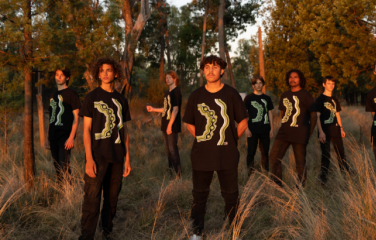Seeking views on new laws to tackle fake Indigenous-style art
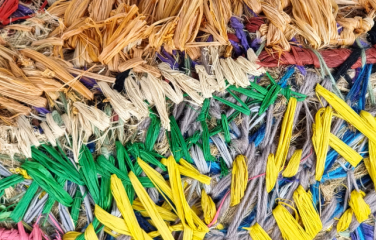
New stand-alone legislation to protect ICIP—Topics for discussion
Scope of the legislation
We are taking a staged approach to developing the legislation. The first stage will address the harm caused by fake Aboriginal and Torres Strait Islander style art, merchandise and souvenirs. Later stages will address the broader rights relating to Indigenous cultural and intellectual property.
We heard from Aboriginal and Torres Strait Islander peoples on the following questions that guided the community engagement sessions held earlier this year. These sessions welcomed all Aboriginal and Torres Strait Islander peoples and relevant stakeholders from the arts and cultural sector to discuss what should be included in the new legislation addressing the harm caused by fake Aboriginal and Torres Strait Islander style art, merchandise and souvenirs.
For a snapshot of the key themes that emerged during the sessions, read the overview of the 2024 community consultation sessions.
Inclusions
1. Which aspects of ICIP do you want protected under the new law?
- All art forms, symbols and designs?
- Languages?
- Medicine?
- Traditional foods?
- Biotechnology?
- Ecological knowledge?
- Spiritual knowledge?
- Artificial intelligence and emerging technologies?
2. What are the rights for Traditional Owners that you want to see protected?
Key concepts
3. What should be the key principles and objectives of the new law?
- Free, informed and prior consent
- Cultural harm—the harm caused by the use of appropriation of Aboriginal and Torres Strait Islander art and culture.
Key Terms and definitions
4. Which terms do you prefer:
- Indigenous/First Nations/Aboriginal and Torres Strait Islander?
- Ownership/Custodianship?
- Traditional Owner/ Traditional Custodian?
5. How should harm caused by breaches of cultural rights be addressed?
Acknowledgment
6. How should acknowledgement of rights be addressed?
Communal ownership
7. How should communal custodianship/ownership of ICIP be recognised when several families may have rights to a design/symbol/style/story?
8. How should decisions to approve the use of ICIP be made?
9. How should free, informed and prior consent be ensured?
10. Who will speak for community? Who will be the rights holders?
11. How should ICIP disagreements be resolved within communities?
Enforcement
12. How do Traditional Owners/ Custodians want to take action against possible breaches of their cultural rights?
- Independently?
- With the assistance of a central cultural authority?
- Government or a Government agency to take action on their behalf?
Other measures
13. What assistance would help Traditional Owners to protect their art?
Reference documents for stand-alone legislation
Further resources will be added throughout the year.
Funding for stand-alone legislation
This page will be updated later this year.
Community engagement sessions
Thank you to everyone who attended a community engagement session and shared their knowledge, views and lived experience. Feedback received will help inform and shape important new laws to protect Indigenous Cultural and Intellectual Property rights.
We held 43 face-to-face community engagement sessions in 38 locations across each state and territory as well as 3 online sessions. These sessions welcomed all Aboriginal and Torres Strait Islander peoples and relevant stakeholders from the arts and cultural sector to discuss what should be included in the new legislation addressing the harm caused by fake Aboriginal and Torres Strait Islander style art, merchandise and souvenirs.
For a snapshot of the key themes that emerged during the sessions, read the overview of the 2024 community consultation sessions.
Read about the topics discussed at the community engagement sessions.
If you would like to discuss protection of Indigenous Cultural and Intellectual Property rights please contact the team.
Office hours 8:30am to 5pm (AEST)
Phone: 1800 006 992 (opt 4)
Email: icip@arts.gov.au
| Location | Date | Registration |
|---|---|---|
| Australian Capital Territory | ||
| Canberra | Monday, 6 May 2024 2:00pm to 5:00pm AEST | Completed |
| New South Wales | ||
| Albury-Wodonga | Monday, 8 April 2024 10:00am to 1:00pm AEST | Completed |
| Coffs Harbour | Monday, 11 March 2024 10:00am to 1:00pm AEDT | Completed |
| Dubbo | Wednesday, 10 April 2024 10:00am to 1:00pm AEST | Completed |
| Lismore | Tuesday, 12 March 2024 10:00am to 1:00pm AEDT | Completed |
| Moree | Friday, 12 April 2024 10:00am to 1:00pm AEST | Completed |
| Parramatta | Friday 5 April 2024 2:00pm to 5:00pm AEDT | Completed |
| Sydney | Thursday, 4 April 2024 10:00am to 1:00pm AEDT | Completed |
| Tweed Heads | Wednesday, 13 March 2024 9:00am to 12:00pm AEDT | Completed |
| Wagga Wagga | Tuesday, 9 April 2024 10:00am to 1:00pm AEST | Completed |
| Walgett | Thursday, 11 April 2024 10:00am to 1:00pm AEST | Completed |
| Wollongong | Wednesday, 3 April 2024 10.30am to 1.30pm AEDT | Completed |
| Northern Territory | ||
| Alice Springs | Monday, 25 March 2024 1:30pm to 4:30pm ACST | Completed |
| Darwin | Tuesday, 16 April 2024 10:00am to 1:00pm ACST | Completed |
| Katherine | Wednesday, 17 April 2024 11:00am to 2:00pm ACST | Completed |
| Yirrkala | Thursday, 18 April 2024 11:00am to 2:00pm ACST | Completed |
| Queensland | ||
| Brisbane | Thursday, 11 April 2024 10:00am to 1:00 AEST | Completed |
| Cairns | Friday, 12 April 2024 10:00am to 1:00 AEST | Completed |
| Gold Coast | Tuesday, 23 April 2024 10:00am to 1:00 AEST | Completed |
| Mount Isa | Friday, 26 April 2024 10:00am to 1:00pm AEST | Completed |
| Rockhampton | Monday, 22 April 2024 10:00am to 1:00pm AEST | Completed |
| Sunshine Coast | Wednesday, 24 April 2024 10:00am to 1:00pm AEST | Completed |
| South Australia | ||
| Adelaide | Monday, 18 March 2024 2:00pm to 5:00pm | Completed |
| Adelaide | Tuesday, 19 March 2024 10:00am to 1:00pm | Completed |
| Ceduna | Thursday, 14 March 2024 11:00am to 2:00pm | Completed |
| Port Augusta | Friday, 15 March 2024 12:30pm to 3:30pm | Completed |
| Tasmania | ||
| Burnie | Monday, 4 March 2024 10:00am to 1:00pm AEDT | Completed |
| Launceston | Tuesday, 5 March 2024 10:00am to 1:00pm AEDT | Completed |
| Hobart | Wednesday, 6 March 2024 10:00am to 1:00pm AEDT | Completed |
| Hobart | Thursday, 7 March 2024 10:00am to 1:00pm AEDT | Completed |
| Torres Strait Islands | ||
| Thursday Island | Monday, 15 April 2024 | Completed |
| Victoria | ||
| Bairnsdale | Friday, 8 March 2024 2:00pm to 5:00pm AEDT | Completed |
| Ballarat | Wednesday, 13 March 2024 10:00am to 1:00pm AEDT | Completed |
| Melbourne | Thursday, 14 March 2024 10:00am to 1:00pm AEDT | Completed |
| Melbourne | Friday, 15 March 2024 10:00am to 1:00pm AEDT | Completed |
| Shepparton | Tuesday, 12 March 2024 9:00am to 12:00pm AEDT | Completed |
| Shepparton | Tuesday, 12 March 2024 1:00pm to 4:00pm AEDT | Completed |
| Western Australia | ||
| Broome | Tuesday, 23 April 2024 2:00pm to 5:00pm AWST | Completed |
| Geraldton | Tuesday, 30 April 2024 10:00am to 1:00pm | Completed |
| Kununurra | Monday, 22 April 2024 | Completed |
| Perth | Monday, 29 April 2024 10:00am to 1:00pm | Completed |
| Port Hedland | Wednesday, 1 May 2024 3:00pm to 6:00pm | Completed |
| National | ||
| Online sessions | Monday, 3 June 2024 | Completed |
| Online sessions | Friday, 14 June 2024 | Completed |
| Online sessions | Wednesday, 26 June 2024 | Completed |
Aboriginal and Torres Strait Islander Expert Working Group on Indigenous Cultural and Intellectual Property
An Aboriginal and Torres Strait Islander Expert Working Group on Indigenous Cultural and Intellectual Property (Expert Working Group) has been established to ensure that Aboriginal and Torres Strait Islander knowledge, expertise and lived experience underpin the development of new legislation to protect Indigenous Cultural and Intellectual Property rights. The group is part of a broader partnership, which brings together Aboriginal and Torres Strait Islander experts and representatives from Australian Government departments to partner in the development of the stand-alone legislation. Read our news story at What's new.
Meet the 8 members of the Expert Working Group who will partner in the development of the new laws.
Dr Terri Janke (Chair)
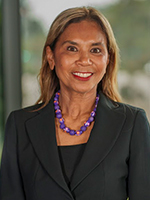
Dr Terri Janke, a Wuthathi, Yadhaigana, and Meriam woman, is the Solicitor Director of Terri Janke and Company, a legal and consulting firm. A global leader in Indigenous Cultural and Intellectual Property (ICIP) rights, she created the True Tracks® Principles, a respected framework for protecting Indigenous Knowledge. With over 20 years of experience, Dr Janke has advised clients on ICIP across sectors including arts, film, culture, cultural and collecting institutions and environmental management. She has also written extensively and produced numerous reports about the need for a new law to protect ICIP.
Chrissy Grant
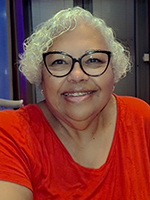
Chrissy Grant is an Elder and descendant of the Aboriginal Eastern Kuku Yalanji from the Jalunji-Warra clan and Torres Strait Islander Mualgal from Kubin on Moa Island. With more than 38 years of experience, she has worked at the national and international levels in cultural and natural resource management. Her work primarily involves collaborating with Traditional Owner groups to identify their cultural values, heritage management, conservation and protection. She held the position of Chair of the AIATSIS Research Ethics Committee for 12 years, and wrote the cultural protocols and ethical guidelines for her Eastern Kuku Yalanji community for the negotiations for the handback of 4 National Parks in the Cape York region.
Aurora Milroy
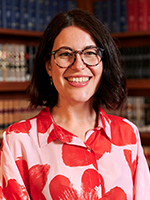
Aurora Milroy is a Palyku woman and the Director of Policy at the National Native Title Council. Her professional experience focuses on Indigenous law, policy and governance and includes previous roles at the University of Western Australia and the Aboriginal and Torres Strait Islander Coalition of Peaks.
Professor Deen Sanders OAM
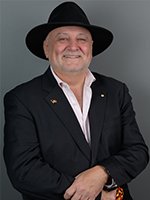
Professor Deen Sanders OAM is a Worimi Giparr (cultural leader) in his community. He has more than 30 years of experience in the corporate environment of regulation and government. He is an expert on governance, law, lore and leadership and has held senior positions in both business and government. He acts as a critical adviser to clients on sensitive and significant matters of ethics, economics, space, climate change and strategy. He has a particular dedication to the role that Indigenous knowledge, culture and science have in shaping the future of business, law and policy – knowing it holds the answer to most of the world's critical challenges.
Craig Aspinall

Craig Aspinall was born and raised on the NSW Lower North Coast and is a descendant of the Kabook and Watoo clans of the Guringay people. He has a special interest in ICIP as it applies to natural resources and the environment. In his management roles across NSW Government agencies, Craig has conducted numerous presentations to introduce the concept of 'What is ICIP?' and ICIP Protocol. Throughout his 32 years of experience in government, not-for-profit, natural resources and education sectors, Craig has delivered various Aboriginal programs including establishing the first Aboriginal Landcare program in NSW, Working Together in 2021. He has actively represented and advocated for the rights and interests of First Nations peoples, especially within his expertise of sea country management.
Bibi Barba

Bibi Barba is a proud Aboriginal saltwater woman and recognised cultural leader from the Darumbal Old, Darkinjung, Cammerygal, Gadigal, Yuin NSW tribal clans. With over 35 years of experience, her artistic talent and artwork have gained international recognition. As an international expert in ICIP, she has empowered herself and educated Aboriginal artists about their rights through various stakeholders such as ArtsLaw and Create NSW, and as a Sydney Metro public art expert advisor and national First Nations consultant for the National Landcare Network. Bibi currently works for Create NSW and is a member of the Indigenous Caucus for the United Nations' World Intellectual Property Organization.
James Morgan

James Morgan is a Bininj man from Kakadu and is currently a senior ranger protecting his family's Country and rock art sites in Kakadu. James is an honorary lecturer at the Australian National University, where he provides conservation and cultural expertise. Additionally, he develops and licenses educational ICIP material for tertiary micro-credentials and courses with Charles Darwin University. He has 10 years of Commonwealth Public Service experience and is completing a Bachelor of Laws. James is passionate about economic self-determination using Bininj knowledge. He founded Yibekka Kakadu Rock Art Tours, focusing on increasing local Aboriginal participation and protecting ICIP.
Dr Alana Gall
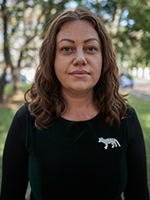
Dr Alana Gall is a proud Truwulway woman from the north-east coast of Lutruwita (Tasmanian Aboriginal). She currently holds the position of Postdoctoral Research Fellow at Southern Cross University, where she leads a research program centred around Indigenous Traditional Medicines in Australia. Her main objectives are to protect and preserve traditional medicines for future generations through health policy and law. Dr Gall has over a decade of experience in research and research translation in Indigenous health, with a strong focus on Indigenous and Decolonising Research Methodologies.
Media enquiries
For media enquiries about the Expert Working Group or Indigenous Cultural and Intellectual Property matters, email media@infrastructure.gov.au.
___________________________________________
The first principle guiding all actions in Australia's National Cultural Policy, Revive: a place for every story, a story for every place, including the development of the stand-alone legislation, is that First Nations arts and culture must be First Nations-led.
The Office for the Arts is committed to ensuring that Aboriginal and Torres Strait Islander peoples are partners in the development of the legislation. This approach aligns with the strong partnership principles to the National Agreement on Closing the Gap Priority Reform One (formal partnerships and shared decision-making).
For more information about the new stand-alone legislation to protect Indigenous Cultural and Intellectual Property, visit the ICIP webpage.
Indigenous Knowledge Partnership to guide new stand-alone legislation
An Indigenous Knowledge Partnership, comprising Aboriginal and Torres Strait Islander experts and government representatives, will support the development of new stand-alone legislation to protect Aboriginal and Torres Strait Islander traditional knowledge and cultural expressions, also known as Indigenous Cultural and Intellectual Property (ICIP).
The development of new stand-alone legislation was announced on 30 January 2023 as part of the Australian Government's 5-year National Cultural Policy, Revive: a place for every story, a story for every place.
The first principle guiding all actions in Revive, including the development of the stand-alone legislation, is that First Nations arts and culture must be First Nations-led. This approach aligns with the strong partnership principles to the National Agreement on Closing the Gap, Priority Reform One (formal partnerships and shared decision-making). The Office for the Arts is committed to ensuring that Aboriginal and Torres Strait Islander peoples are partners in the development of the stand-alone legislation.
The Australian Government has provided $13.4 million over 4 years to support the development of the new legislation, including for grants and training.
Applications to join our Aboriginal and Torres Strait Islander Expert Working Group on ICIP—a component of the Indigenous Knowledge Partnership—closed on 20 September 2024. For information about the opportunity and how to apply, visit the Aboriginal and Torres Strait Islander Expert Working Group on Indigenous Cultural and Intellectual Property page.
Protecting Indigenous Cultural and Intellectual Property
Protecting Indigenous Cultural and Intellectual Property rights
The Australian Government has committed to introducing new laws to protect Aboriginal and Torres Strait Islander traditional knowledge and cultural expressions, including to address the harm caused by fake art, merchandise and souvenirs. Aboriginal and Torres Strait Islander traditional knowledge and cultural expressions can also be referred to as 'Indigenous Cultural and Intellectual Property' or 'ICIP'.
What is ICIP?
Indigenous Cultural and Intellectual Property is a broad term which is used to refer to the rights Aboriginal and Torres Strait Islander people have to their heritage and culture. ICIP includes knowledge, songlines, language, dance, symbols and art as well as medicines, language, bush foods, sacred sites and ecological knowledge.
What we're doing
This commitment to develop new laws through a First Nations-led process was announced in the National Cultural Policy, Revive: a place for every story, a story for every place on 30 January 2023.
Watch Patricia Adjei, Wuthathi and Mabuiag Islander and Director of the Stand-alone Legislation team, talk about what we're doing to protect Indigenous Cultural and Intellectual Property rights. Trish shares some of the feedback received during first round engagement sessions from communities across Australia.
Hear from Aboriginal and Torres Strait Islander artists and industry workers
Aboriginal and Torres Strait Islander artists and industry workers share their insights and experiences with fake art and ICIP, and the effect it has on Aboriginal and Torres Strait Islander artists and communities.
There are 5 short videos in the series. Topics include:
- What does fake or inauthentic art mean to you?
- What would you like consumers to know before purchasing Indigenous art?
- Have you experienced cultural harm because someone used your artwork without permission?
- Why is the protection of Indigenous Cultural and Intellectual Property important?
- What would protecting your art and culture mean for you and your mob?
Contact us
If you have any questions about the process or how you can be involved, please get in touch with our Indigenous Cultural and Intellectual Property team:
Office hours 8:30am to 5pm (AEST)
Phone: 1800 006 992 (opt 4)
Email: icip@arts.gov.au
Stay up to date with news and announcements or join the conversation online
- Subscribe for updates.
- Follow us on social media and join the conversation using the hashtag #ICIP:
Support available for First Nations languages and arts activities
